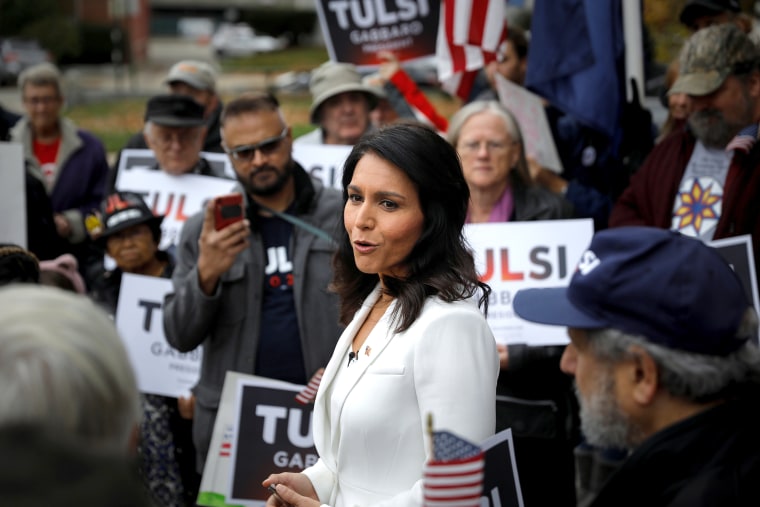WASHINGTON — Among Democrats running for president, Tulsi Gabbard is popular with Russian propagandists, while Joe Biden draws the most criticism, according to a new analysis.
Mentions of Gabbard, a Hawaii congresswoman, by English-language Russian propaganda outlets were 46 percent favorable and 44 percent unfavorable, a research team from the Foreign Policy Research Institute found after analyzing more than 1,700 news stories put out by Sputnik and Russia Today, or RT. She was the only Democratic candidate with more favorable than unfavorable mentions.
References to the former vice president, by contrast, were 3 percent favorable and 53 percent unfavorable. The rest were neutral.
For Russia thus far, Biden is to 2020 what Hillary Clinton was to 2016, the researchers found.
"When I watched Russian state-sponsored content and social media trolling headed into election 2016, it was overwhelmingly negative toward Hillary Clinton. The same could be said today of former Vice President Biden," said Clint Watts, a former FBI agent and NBC News contributor who led the effort.

"RT and Sputnik content in total volume is exceptionally higher for Vice President Biden, more so than normal U.S. election coverage. … Russia often amplifies President Trump's disparagement of Biden, and this adds to the negative coverage overall."
For its report, the nonpartisan Foreign Policy Research Institute's Foreign Influence Election 2020 Project assembled a research team to analyze what Kremlin state-sponsored news outlets say about the 2020 U.S. election and the presidential candidates.
The team analyzed Russia Today and Sputnik News articles from Jan. 1 to Nov. 10, 2019 that pertained to the 2020 presidential election, including 705 RT stories and 1,006 Sputnik News stories.
Those 1,711 stories hosted 2,772 mentions of either the president, Republican candidates or Democratic candidates for president in 2020.
More than half of those mentions referenced President Donald Trump, which the team said will be analyzed in a separate upcoming release. Mentions were evaluated as "neutral," "favorable" of the candidate or "unfavorable" of the candidate.
The team also logged an additional 319 mentions of former presidents and presidential candidates, which will be analyzed later, they said.
Why Gabbard?
There are a number of reasons many Russian propagandists express support for Gabbard, Watts said.
"Gabbard is saying everything Russia wants Americans to hear," he said. "She's a U.S. Army officer, and combat veteran claiming — incorrectly — that the U.S. backs al Qaeda. She calls the U.S. an imperialist power that should withdraw from the world. Her anti-war stance as a military member and shaming of U.S. establishment leaders is a wonderful vehicle for the Kremlin to divide the political left and pit populists against the establishment."
Gabbard spokesman Mark Bergman responded in a statement to NBC News: "The warmongering foreign policy establishment in the media has been using this same smear since the day Congresswoman Gabbard announced her candidacy. This is nothing new. As the first female combat veteran ever to run for the presidency, the American people know that Tulsi has always and will always fight for the interests of the American people."
NBC News reported in February that Gabbard was a favorite among English language Russian propaganda sites. On Twitter, Gabbard accused NBC of seeking to "to smear any adversary of the establishment wing of the Democratic Party — whether on the left or the right — as a stooge or asset of the Kremlin.'"
In another tweet, Gabbard added, "As commander-in-chief, I will work to end the new cold war, nuclear arms race and slide into nuclear war. That is why the neocon/neolib warmongers will do anything to stop me."
Mike Carpenter, a former Pentagon official and Russia expert who advises the Biden campaign informally, told NBC News the Russians "clearly see Biden as a voice that has stood up to Russian aggression. Clearly they want to take Biden down. I think their preferred candidate is Donald Trump but they are willing to support especially candidates on the far left."
Carpenter said Russian propagandists have helped fuel two of the conspiracy theories behind the current impeachment investigation, namely that Ukraine had a role in hacking the Democrats in 2016 and that Biden acted improperly when he carried out U.S. policy in helping secure the removal of a prosecutor the State Department believed was corrupt.
"I see Russia as at a minimum playing an important role to propagate these conspiracies," he said.
Russian propaganda mentions of the other Democratic candidates have been mostly neutral, the study found, although the sites have begun to criticize Massachusetts Sen. Elizabeth Warren as she has risen in the polls.
After the breadth of Russian influence operations during the 2016 election became clear, researchers began to try to track Russian bots and trolls on Twitter and other social media platforms.
In response, experts say, Russian and other foreign actors have taken steps to further obscure and disguise their activity, making it extremely difficult to track foreign bots and trolls. One measurement tool, a web site known as Hamilton 68 hosted by the German Marshall Fund, changed its focus to monitor overt Russian state-funded media, just as the Foreign Policy Research Institute is doing.
"Much of the bot and troll activity out there is unattributed," Watts said. "We don't know what is Russian or not Russian, and when researchers mistakenly attribute the free speech of Americans as a secret Russian bot, it degrades electorate confidence in researchers' ability to detect Russian influence or that it even exists. Improper attribution also makes Russia seem more powerful than they really are."
Therefore, Watts said, it makes sense to pay close attention to what the Russians and other foreign governments are saying in the open, in state-funded media.
"If you read Russia, Iran and China's propaganda, they'll tell you where to start digging," he said.
